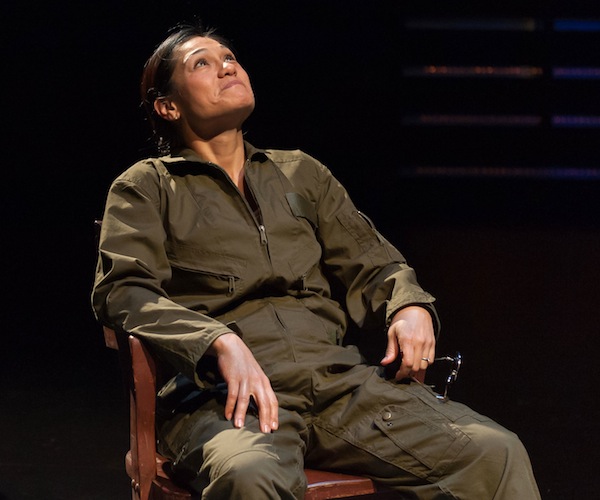Fuse Theater Review: “Grounded” — The Costs of a Long-Distance War
Celeste Oliva’s performance is so raw, we experience every doubt, every fear, and watch her confidence slowly evaporate under pressure.
Grounded, by George Brant. Directed by Lee Mikeska Gardner. Presented by the Nora Theatre Company at Central Square Theatre, Cambridge, through March 22.

Celeste Oliva in the Nora Theatre Company production of “Grounded.” Photo: A.R. Sinclair Photography.
By Terry Byrne
In Grounded, playwright George Brant’s imagery soars even as his topic remains rooted in the earth-bound issue of the ongoing “war on terror.” In the Nora Theatre Company production, a taut performance by Celeste Oliva and elegant direction by Lee Mikeska Gardner keep this play on target, even when Brant occasionally drifts.
Grounded is a solo show that follows a nameless female fighter pilot (Oliva) who is grounded when she becomes pregnant. Returning to duty when her daughter is three, she is reassigned to the Creech Air Force base in the Nevada desert where she is retrained to be a “drone” pilot, a member of the “chair force” as she mockingly dubs it.
In the first half of Brant’s play, The Pilot is excessively macho, talking about kicking back after a mission “with my boys,” traits that seem overdramatized considering how few female fighter pilots there are (less than 2%) and how much scrutiny these women are under. But Oliva’s performance is so layered she draws us into the pilot’s emotional world without hesitation.
Steven Royal’s set design creates a small circular playing area for The Pilot, and Oliva takes advantage of the proximity of the audience seated all around her. She looks directly at individual audience members, making references to the music she likes, looking for agreement or reaction to whatever she’s experiencing. Gardner’s direction is so detailed and nuanced, Oliva works every edge of the stage area, whether seated in a rolling desk chair or pacing with the energy of caged tiger. Oliva’s performance is so raw, we experience every doubt, every fear, and watch her confidence slowly evaporate under pressure.
Oliva makes this dramatic journey compelling. From the awkward beginning to The Pilot’s melting attraction to the man who becomes her husband and the family life she begins to build, Oliva plays The Pilot as someone who cannot believe her good fortune. As much as she defined herself by her love for flying, the opportunity to come home every night to her family seems like a reasonable tradeoff for fighting a war behind a computer screen rather than across the globe above a foreign country.
But the long hours of staring at a screen, the long-term surveillance of a “target” and the re-entry from a military mentality to a civilian mentality in the length of time it takes to commute across the desert from her base to her home, make it increasingly difficult to separate home life from the war zone.
Brant is at his best when he sets up a collision between The Pilot’s passion for flying and her passion for her family. As she struggles with reconciling her love for being up “in the blue” with her job “in the gray,” the stress of drone pilots becomes painfully obvious. Even more powerful is the sense of empathy that begins to creep over The Pilot. Despite the distance, the impact of the bombs she unleashes is visible and the cost of war takes a personal toll. And that agonized sense of moral responsibility grows in us: we ache for every decision she must make and worry about the impact.
Terry Byrne has been writing about the arts for nearly two decades. She has an MFA in Playwriting from Boston University and is a Resident Scholar at Brandeis University’s Women’s Studies Research Center.
Tagged: Celeste Oliva, drone strikes, drones, George Brant, Grounded
